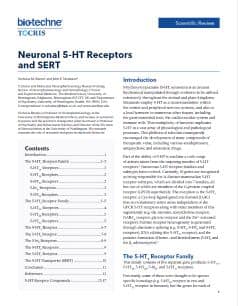5-HT Receptors
5-Hydroxytryptamine (5-HT, serotonin) is a monoamine neurotransmitter synthesized from L-tryptophan in serotonergic neurons and enterochromaffin cells of the gastrointestinal tract. 5-HT acts at serotonin receptors, which have been classified into seven groups (5-HT1-7) based on their pharmacological profiles, cDNA-deduced primary sequences and signal transduction mechanisms.
5-HT Receptor Target Files
Related Targets
Except for the 5-HT3 receptor, which is a ligand-gated ion channel, 5-HT receptors belong to the G-protein-coupled receptor (GPCR) superfamily. The 5-HT1, 5-HT2, 5-HT3 and 5-ht5 receptor groups have been further subdivided. In the CNS, serotonin has an important role in the regulation of mood, emesis, sexuality, sleep and appetite. Abnormalities in serotonergic function have been implicated in many disease states such as depression, anxiety, schizophrenia and migraine.
Literature for 5-HT Receptors
Tocris offers the following scientific literature for 5-HT Receptors to showcase our products. We invite you to request* your copy today!
*Please note that Tocris will only send literature to established scientific business / institute addresses.
5-HT Receptors Scientific Review
Written by Nicholas M. Barnes and John F. Neumaier, this review summarizes the various serotonin receptor subtypes and their importance in mediating the role of serotonin in numerous physiological and pharmacological processes. Compounds available from Tocris are listed.
Depression Poster
Major depressive disorder is characterized by depressed mood and a loss of interest and/or pleasure. Updated in 2015 this poster highlights presynaptic and postsynaptic targets for the potential treatment of major depressive disorder, as well as outlining the pharmacology of currently approved antidepressant drugs.
5-HT Receptor Data
| Receptor Subtype | Transduction Mechanism | Localization | Function | Specific Agonists | Specific Antagonists |
|---|---|---|---|---|---|
| 5-HT1A | ↓AC (Gi/o) | Limbic system (hippocampus, lateral septum, cortical areas), mesencephalic raphe nuclei | Hyperpolarization, modulation of neurotransmitter release, anxiolysis, hypothermia, hyperphagia |
Xaliprofen (2491) S 14506 (1771) Ipsapirone (1869) BP 554 (0556) Tandospirone (2854)* |
MM 77 (0933) NAN-190 (0553) Spiroxatrine (0631) (S)-WAY 100135 (1253) |
| 5-HT1B | ↓AC (Gi/o) | Basal ganglia, striatum, amygdala, trigeminal ganglion, vascular smooth muscle | Autoreceptor, locomotion, hypophagia, hypothermia, modulation of neurotransmitter release, vasoconstriction |
CGS 12066B (0638) CP 93129 (1032) CP 94253 (1317) 5-Nonyloxytryptamine (0901) |
GR 55562 (1054) Isamoltane (0992) SB 224289 (1221) NAS-181 (1413) |
| 5-HT1D | ↓AC (Gi/o) | Basal ganglia, hippocampus, cortex, spinal cord, vascular smooth muscle | Autoreceptor, modulation of neurotransmitter release |
L-694,247 (0781) GR 46611 (0864) PNU 109291 (2556) PNU 142633 (1985) |
BRL 15572 (1207) Cyanopindolol (0993) LY 310762 (3078) |
| 5-ht1E | ↓AC (Gi/o) | Cortex, caudate putamen, claustrum, hippocampus, amygdala | Unknown | BRL 54443 (1129) | - |
| 5-HT1F | ↓AC (Gi/o) | Hippocampus, cortex, dorsal raphe nucleus, uterus | Speculative role in visual and cognitive function |
BRL 5443 (1129) LY 344864 (2451) LY 334370 (3079) |
- |
| 5-HT2A | ↑ PLC | Forebrain, caudate nucleus, nucleus accumbens, hippocampus, olfactory tubercle, vascular smooth muscle, blood platelets | Neuronal depolarization, head twitch, hyperthermia, modulation of neurotransmitter release smooth muscle contraction, platelet activation | TBC-2 (2592) |
R- 96544 (1742) Spiperone (0995) MDL 11,939 (0870) 4F 4PP (0523) Risperidone (2865) |
| 5-HT2B | ↑ PLC | Brain, stomach fundus (rat), gut, heart, kidney, lung | Contraction of the stomach fundus, anxiety | BW 723C86 (1059) |
SB 204741 (1372) LY 272015 (3077) |
| 5-HT2C | ↑ PLC | Choroid plexus, cortex, limbic system, basal ganglia | Hypolocomotion, hypophagia, penile erection, hyperthermia, anxiety, ↓ noradrenalin and dopamine release |
MK 212 (0941) Ro 60-0175 (1854) WAY 161503 (1801) CP 809101 (3041) 1-Methylpsilocin (3017) |
N-Desmethylclozapine (1007) RS 102221 (1050) SB 242084 (2901) |
| 5-HT3 |
Ion channel (Na+, K+, Ca2+) |
Dorsal vagal complex, hippocampus, amygdala, caudate, cerebral cortex, heart, intestines | Anxiety, cognition, pain , reward/withdrawal, vomiting reflex, vasodilation, intestinal tone and secretion |
SR 57227 (1205) Quipazine (0629) 1-phenylbiguanide (0969) m-chlorophenylbiguanide (0440) |
MDL 72222 (0640) Tropisetron (2459) Y-25130 (0380) Ondansetron (2891) Granisetron (2903) |
| 5-HT4 | ↑ AC (Gs) | Cerebral cortex, limbic areas, hippocampus, colliculus, intestines | Learning and memory, visual perception, anxiety, motor coordination, arousal, smooth muscle relaxation, modulation of neurotransmitter release |
Cisapride (1695) RS 67333 (0989)* RS 67506 (0990)* CJ 033466 (3089)* |
GR 113808 (1322) GR 125487 (1658) RS 39604 (0991) RS 23597-190 (0728) |
| 5-ht5A | ↓ AC (Gi/o) | Amygdala, hippocampus, caudate nucleus, cerebellum, hypothalamus, thalamus, substantia nigra, spinal cord | Modulation of exploratory behavior and locomotion | - | SB 699551 (3188) |
| 5-HT6 | ↑ AC (Gs) | Striatum, olfactory tubercles, nucleus accumbens, hippocampus, stomach, adrenal glands | Memory and learning, modulation of neurotransmitter release |
5-Methyl-5-hydroxytryptamine (0558) EMD 386088 (2382) |
SB 258585 (1961) Ro 47-1816/001 (2911) SB 399885 (3189) NPS ALX Compound 4a (3285) |
| 5-HT7 | ↑ AC (Gs) | Thalamus, hypothalamus, hippocampus, cerebral cortex, amygdala, GI and vascular smooth muscle, heart | Circadian rhythms, smooth muscle relaxation, nociception, hypotension, modulation of REM sleep, learning and memory, LH release |
AS 19 (1968) LP 44 (2534) LP 12 (2925) |
Pimozide (0937) SB 269970 (1612) SB 259719 (2726) |
* partial agonist
References
Hoyer et al (1994) VII. International union of pharmacology classification of receptors for 5-hydroxytryptamine (serotonin). Pharmacol. Rev. 46 157. Barnes and Sharp (1999) A review of central 5-HT receptors and their function. Neuropharmacol. 38 1083. Pauwels (2003) 5-HT receptors and their ligands. Tocris Reviews No. 25.

